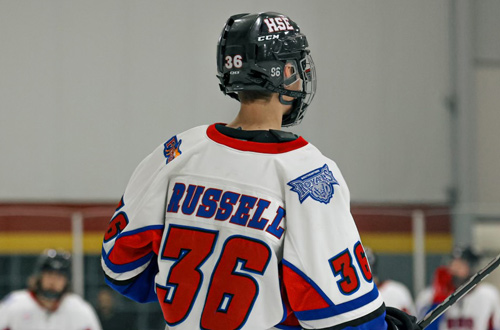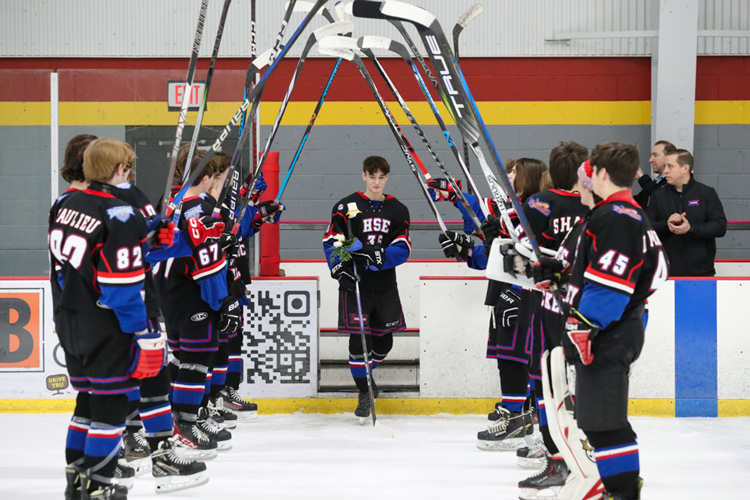Despite two medical conditions, Anthony Russell keep his commitment to himself & other players
By RICHIE HALL
Imagine that one minute, you’re playing the sport that you love – then the next minute, you’re passed out on the ice.
As scary as it sounds, it’s the reality for Anthony Russell. The Hamilton Southeastern senior who has a passion for the sport of hockey has been dealing with that reality for the past couple of years. His condition was undiagnosed until recently when he found out he had POTS syndrome, a blood circulation disorder, and neurocardiogenic syncope, a fainting spell that happens when someone’s body overreacts to certain triggers.
Despite these lifelong challenges, Russell is determined to not let his conditions stop him “from staying close to the game I adore. I refuse to let go of my passion. I turned these challenges into opportunities for growth.”
Russell said he has been playing hockey since he was “6 or 7 years old.” During his sophomore year at HSE, he began to experience what he called “troubling symptoms: dizziness, breathlessness and weakness.” He went to the doctor and after an EKG test, was prevented from playing hockey. But it turned out there was an error with the machine.
“So, I was cleared to play hockey,” said Russell. “But the symptoms did persist.”
During his sophomore year, Russell was a practice player, so he didn’t get to play during games. “I struggled to keep up with everyone,” he said.
Russell’s symptoms became worse during his junior year.

(Photo provided)
“I began to pass out quite frequently,” said Russell. “This happened during games and practices both. Everyone was worried and so was I. I didn’t know what was going on at the time.”
Russell said that during that year, passing out became what he called “a terrifying, yet often norm.”
“For me, it looks like someone turns out the lights in the room,” said Russell. “It’s incredibly scary. Seeing everyone surrounding you. It’s terrifying in itself because your body doesn’t want you to pass out. Something is wrong.”
“It’s just very scary,” he said. “Passing out’s like being trapped in a nightmare. I feel very powerless. It’s sometimes in those moments that I find strength that I didn’t know I had.”
Russell finally started to get some answers about what his condition was as his senior year began. After many tests – “on my lungs, my heart, everything you could think of,” he said – Russell got his first diagnosis, neurocardiogenic syncope, last September.
Also known as vasovagal syncope, neurocardiogenic syncope occurs after triggers such as the sight of blood or extreme emotional distress, according to the Mayo Clinic.
“The vasovagal syncope trigger causes your heart rate and blood pressure to drop suddenly. That leads to reduced blood flow to your brain, causing you to briefly lose consciousness,” said an article on the Mayo Clinic website (LINK: https://www.mayoclinic.org/diseases-conditions/vasovagal-syncope/symptoms-causes/syc-20350527)
Russell received that diagnosis around the time he met David DiMartino, who took over as the head coach of the HSE Prep Team (the hockey team for the Hamilton Southeastern Schools district) in August. DiMartino said he had spoken to the HSE coach from the previous year and had gotten a heads up about Russell’s condition.
“At the time, we knew it was happening, we didn’t know why,” said DiMartino. “It was a little concerning at first.”
“I was worried,” said DiMartino. “I said, ‘Are you cleared to play?’ And he was. It was something to keep an eye out for. I didn’t know what to make of it until we had an incident. I was hoping it was never going to happen.”

(Photo provided)
But the HSE team worked through it. Russell said he carried a backpack of medical tools to every practice.
“He seemed pretty well-versed to what to do in those situations,” said DiMartino. “One of my assistant coaches is a fireman, so he’s medically trained as well.” As a result, DiMartino said the team was “in good shape to handle anything that happened.”
Russell said he found out about his other condition, POTS syndrome “about a month ago.” POTS stands for “postural orthostatic tachycardia syndrome,” which causes an increased heart rate whenever someone rises to a standing position.
“I felt a lot of relief,” said Russell. “I felt that I had closure and I had answers. When that kind of thing happens, people want answers.”
Russell had the support of his team, which he said “means so much to me.” He also found strength in the love of the game and found ways to turn his diagnoses into a positive.
“I turned these challenges into opportunities for growth,” said Russell. “I began coaching various sports, started an athletic spirit club at my school, and guided my own youth hockey team.”
Russell coaches at Learn to Play Hockey, which has practices at Carmel Skadium and the Fuel Tank in Fishers. He also coaches another team in Carmel, which features players from ages 4 to 12 and 13, with the vast majority 6 or 7.
“They’re an absolute joy to work with,” said Russell.
J.J. Beck is the Director of Program Development for the Indianapolis Youth Hockey Association (IHYA). She met Russell more than a year ago but noted that his connection to the sport dates back several years.
“I admire Anthony’s perseverance and dedication to hockey in spite of facing challenges related to his condition,” said Beck. “It is remarkable how he has maintained a strong passion for the sport and managed to stay actively involved in the hockey community. His ability to navigate his condition while continuing to contribute to the sport is inspiring.”
Russell is headed to Ball State University, where he wants to go into nursing or pediatrics. “I definitely have a passion for helping people,” he said.
Russell also wants his story to prove that even if someone people are facing hardships, it’s possible for them to pursue what they love.
“I believe my experience can inspire others facing similar challenges and show the importance of courage and determination in the face of challenges,” said Russell.

